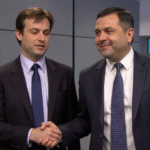Introduction
In the first part, we explored how money, instead of bringing people together, can evoke deep emotions and division within family relationships. Often, families avoid discussing finances due to various reasons: fear of conflict, appearing uninterested or ungrateful, or simply not wanting to create unnecessary worries.
Consequences of Avoiding Financial Discussions
The absence of dialogue, however, leads to detrimental consequences such as misunderstandings, distance, and resentment that can even cause family breakups.
Example Scenario
Consider a family with two sons: one is highly successful, holding a top executive position in a multinational company, married, owns two houses, and has a solid investment portfolio. The other son is an artist struggling financially, homeless, and without prospects. The parents are concerned about the struggling son and decide to buy him a property, believing it would provide him with something tangible.
The successful son perceives this as a complete injustice. He questions, “Why was a house bought for him while I received nothing? Why does he, who has done nothing with his life, receive benefits, whereas I have always strived to make my parents proud and received less in return? It seems being useless brings more advantages.”
Importance of Open Communication in Families
Leaving these topics unaddressed can create deeper, more damaging wounds. In contrast, the author recalls that their parents always communicated openly about their legacy for the children. From a young age, everyone knew they had a will, inheriting each other but with equal portions distributed among all if both parents were gone.
In life, their support varied due to different needs. When the author got married, parents helped furnish the apartment. The father continued providing gas money, photocopying allowance, food, and occasional entertainment for a couple of years, which was invaluable for starting out.
The author’s siblings received different support. Their father was transparent, explaining his reasons for varying support and emphasizing shared values. This openness fostered a strong sibling relationship, with no money-related conflicts.
Lessons Learned
The author’s experience taught them that families can transform their relationship with money by building intentional communication bridges. Their father demonstrated vulnerability and openness, sharing his concerns and reasons for supporting one sibling over another. This approach helped align decisions with shared values, fostering a strong family bond.
Advice for Families with Legacies
Families intending to pass on a legacy should initiate conversations starting from the top (the wealth creator), emphasizing values and discussing a shared purpose of that wealth.
The key is not just to avoid family conflicts and disputes but also to transmit a purpose. Money is merely a tool, never an end in itself, and this distinction must always be clear.
The most valuable investment a wealthy family can make is not in values or real estate but in building a common language, shared purpose, and a multi-generational legacy project. This is the only true lasting legacy: united, resilient families guided by what truly matters.
Final Thoughts
Though not financially savvy, the author’s father understood the importance of these conversations. He was generous, loving, and prioritized his family above all else. This piece is dedicated to him from the bottom of the author’s heart.
Key Questions and Answers
- Q: Why is it important to discuss finances within families? A: Open communication about money helps avoid misunderstandings, resentment, and family breakups by fostering trust and shared understanding.
- Q: How can families with legacies ensure their values are passed on? A: Initiate conversations starting from the top, emphasizing values and discussing a shared purpose of that wealth.
- Q: What is the most valuable investment a wealthy family can make? A: The most valuable investment is building a common language, shared purpose, and a multi-generational legacy project.






